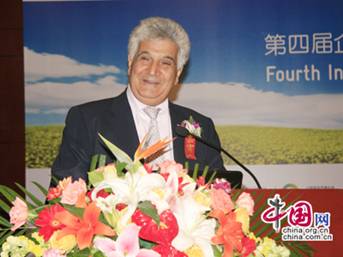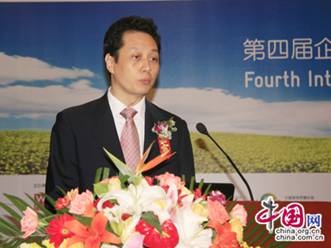He stressed that the true potential of CSR is to help redefine the purpose of business, which is to contribute to sustainable development in three dimensions - social and environmental as well as economic.
 |
|
Mr. Serge Abou, ambassador of the European Commission Delegation to China, delivers a speech at the Fourth International Corporate Social Responsibility (CSR) Forum in Beijing on June 5, 2009. [Wang Ke / China.org.cn]
|
Mr. Abou suggested that through CSR addressing the innovative goods and better services they provide, companies can begin to address some key social and environmental challenges.
"If businesses can articulate their own purpose as being the provision of solutions to societal problems and contributing to sustainable development, then they will increasingly earn the trust of citizens and politicians alike," he said.
While companies seek economic results, they should adopt a prudent, steady, and responsible attitude towards market operations, give full consideration to stability in their overall economic operations, conscientiously deal with various types of risks and hidden worries, and take the initiative to prevent the impact of improper management on economic development and the people's livelihood, said Chinese President Hu Jintao at the 2008 APEC CEO Summit.
Mr. Hu called for companies to establish the concept of global responsibility, voluntarily include social responsibility in their management strategy, abide both by the laws of the country where the companies operate and by international common business practices, improve their management models, and pursue unity of economic results and social results.
He also emphasized that governments should step up guidance and supervision, and create a positive environment for companies to fulfill their social responsibility through drawing up and implementing improvements in legislation.
At Friday's forum, Mr Wang Chao, Assistant Minister of Commerce of China, told China.org.cn that the Chinese government will strengthen supervision over business, and support responsible corporations whilst restricting the behavior of irresponsible corporations.
 |
|
Mr Wang Chao, Assistant Minister of Commerce of China, speaks at the Fourth International Corporate Social Responsibility (CSR) Forum in Beijing on June 5, 2009. [Wang Ke / China.org.cn]
|
He said: "we will strive to promote fast and sound economic development in a favorable CSR policy environment in line with the Chinese principle of a 'scientific outlook on development'."
In order to share experience with Chinese government and business, Mr. Abou highlighted three aspects of European policy on CSR.
First, the EU has made a commitment to include as far as possible all major stakeholder groups in discussion on CSR policy.
Second, what young people learn about business during their education is important. "Now an increasing number of business schools in China are taking an increasingly serious approach to the teaching of CSR," said Mr. Abou. "I wish to commend them for that."
Third, government should engage also with small and medium-sized enterprises. CSR is not the exclusive terrain of large multinational companies and if people want it to shape the economic model, then a full range of businesses need to be involved.
He said: "The good news is that small businesses are not 'less responsible' than larger ones now. They often have high social and ethical standards whether or nor they know and use the term CSR."